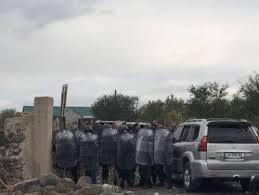RFERL, October 02, 2017
Russia has led its partners in the Eurasian Economic Union (EEU) with the highest ranking among the group in the World Economic Forum (WEF) 2017-18 Global Competitiveness Report.
Russia ranked 38th on the list of 137 countries rated in this year’s WEF report, while Kazakhstan was next at 57 on the Global Competitiveness Index (GCI).
Other EEU nations ranked were Armenia, at 73, and Kyrgyzstan at 102. Belarus, also a member of the economic grouping, was not ranked.
Other countries ranked included Azerbaijan at 35; Georgia at 67; Iran at 69; Tajikistan at 79; Ukraine at 81; Moldova at 89; and Bosnia-Herzegovina at 103.*
Pakistan was listed at 115, up from 122 a year earlier.
Switzerland topped the list, with the United States in second place. Singapore was third, the Netherlands came in fourth, and Germany ranked fifth.
“Global competitiveness will be more and more defined by the innovative capacity of a country,” said Klaus Schwab, WEF executive chairman.
“Talents will become increasingly more important than capital and therefore the world is moving from the age of capitalism into the age of ‘talentism,’” he added.
“Countries preparing for the Fourth Industrial Revolution and simultaneously strengthening their political, economic, and social systems will be the winners in the competitive race of the future.”
The report noted Russia’s five-point improvement from the previous year, but cautioned that “its economy remains highly dependent on mineral exports and prospects remain uncertain.”
It said “weak links” include the financial market, particularly the banking sector; aspects of property rights; judicial independence; and corruption, “which remains one of the most problematic factors for doing business.”
Russian Economy Minister Maksim Oreshkin told state-run TASS news agency that his country’s improved ranking was a result of structural reforms “we had implemented in the macroeconomic policy sphere."
He added that Russia “still has things to do, particularly in such areas as competition and introduction of new technologies.”
The WEF said the index was based on “12 pillars” -- institutions, infrastructure, macroeconomic environment, health and primary education, higher education and training, goods-market efficiency, labor-market efficiency, financial-market development, technological readiness, market size, business sophistication, and innovation.
No comments yet.
- EU DODGES CATALONIA INDEPENDENCE QUESTION Europe - EU 03.10.2017
- TURKIC COUNCIL SERVES AS IMPORTANT PLATFORM FOR ADVANCING COOPERATION AMONG ITS MEMBERS The Caucasus and Turkish-Armenian Relations 03.10.2017
-
 CHURCH OF GEORGIAN-ARMENIAN DISCORD
The Caucasus and Turkish-Armenian Relations
03.10.2017
CHURCH OF GEORGIAN-ARMENIAN DISCORD
The Caucasus and Turkish-Armenian Relations
03.10.2017
- ECB RELIANCE ON BANKERS' FEEDBACK RAISES CAPTURE RISK - ACTIVIST GROUP Europe - EU 03.10.2017
- EU COMMISSIONER LOOKS FORWARD TO ‘GROUNDBREAKING’ DEAL WITH ARMENIA The Caucasus and Turkish-Armenian Relations 03.10.2017
-
25.01.2016
THE ARMENIAN QUESTION - BASIC KNOWLEDGE AND DOCUMENTATION -
12.06.2024
THE TRUTH WILL OUT -
27.03.2023
RADİKAL ERMENİ UNSURLARCA GERÇEKLEŞTİRİLEN MEZALİMLER VE VANDALİZM -
17.03.2023
PATRIOTISM PERVERTED -
23.02.2023
MEN ARE LIKE THAT -
03.02.2023
BAKÜ-TİFLİS-CEYHAN BORU HATTININ YAŞANAN TARİHİ -
16.12.2022
INTERNATIONAL SCHOLARS ON THE EVENTS OF 1915 -
07.12.2022
FAKE PHOTOS AND THE ARMENIAN PROPAGANDA -
07.12.2022
ERMENİ PROPAGANDASI VE SAHTE RESİMLER -
01.01.2022
A Letter From Japan - Strategically Mum: The Silence of the Armenians -
01.01.2022
Japonya'dan Bir Mektup - Stratejik Suskunluk: Ermenilerin Sessizliği -
03.06.2020
Anastas Mikoyan: Confessions of an Armenian Bolshevik -
08.04.2020
Sovyet Sonrası Ukrayna’da Devlet, Toplum ve Siyaset - Değişen Dinamikler, Dönüşen Kimlikler -
12.06.2018
Ermeni Sorunuyla İlgili İngiliz Belgeleri (1912-1923) - British Documents on Armenian Question (1912-1923) -
02.12.2016
Turkish-Russian Academics: A Historical Study on the Caucasus -
01.07.2016
Gürcistan'daki Müslüman Topluluklar: Azınlık Hakları, Kimlik, Siyaset -
10.03.2016
Armenian Diaspora: Diaspora, State and the Imagination of the Republic of Armenia -
24.01.2016
ERMENİ SORUNU - TEMEL BİLGİ VE BELGELER (2. BASKI)
-
AVİM Conference Hall 24.01.2023
CONFERENCE TITLED “HUNGARY’S PERSPECTIVES ON THE TURKIC WORLD"









